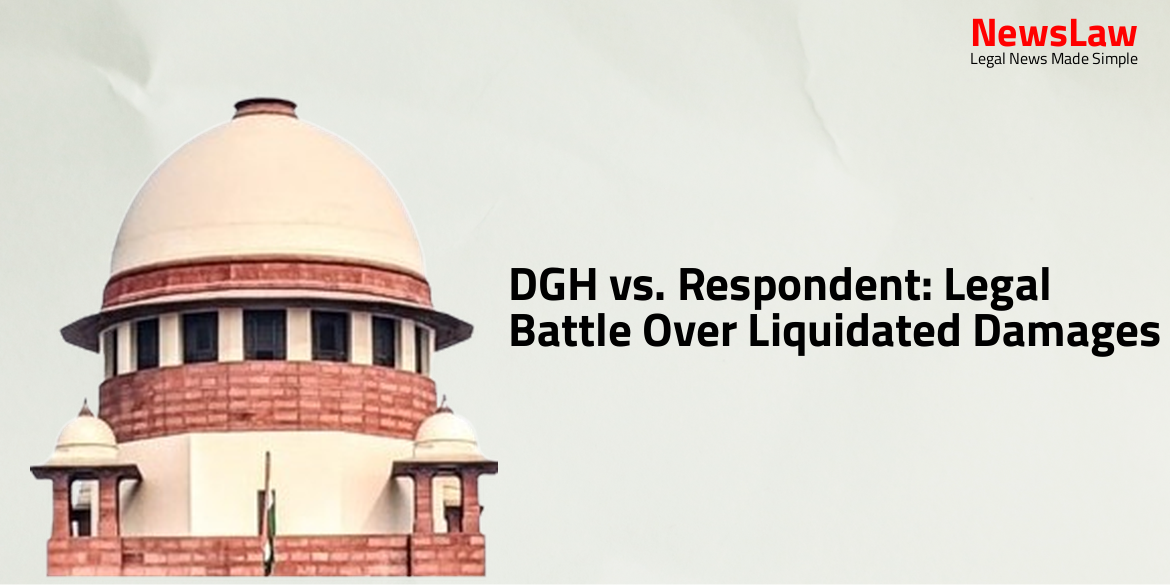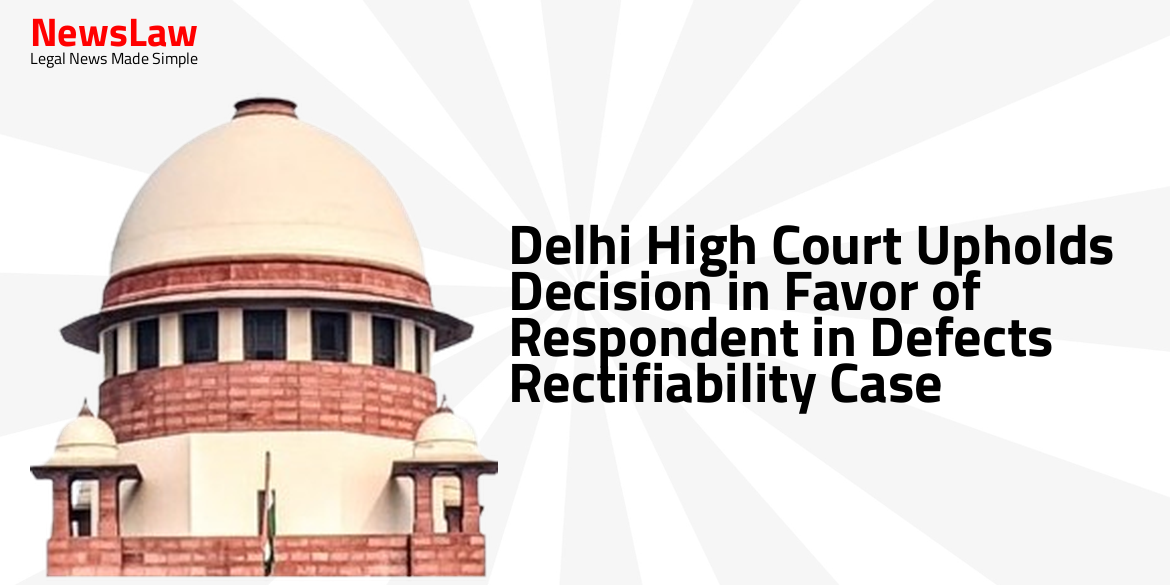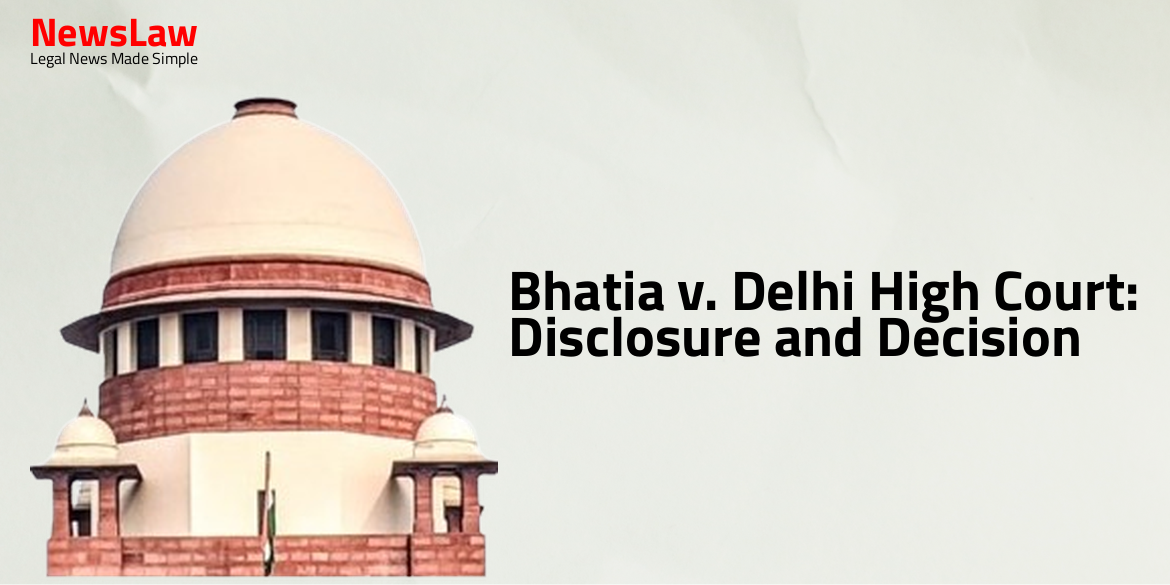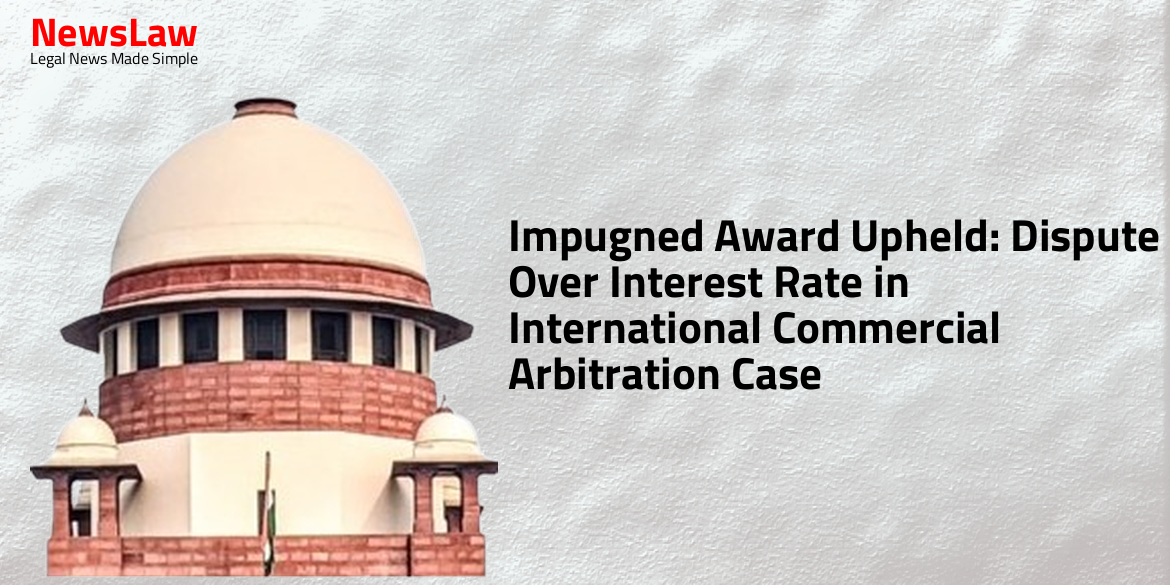The Supreme Court of India has recently issued a significant ruling in the case of DGH vs. Respondent, concerning a dispute over the calculation of liquidated damages. The court’s decision addresses the flawed computations adopted by the Arbitral Tribunal and the implications of the NEP, 2006 on such claims. Stay tuned to learn more about this legal battle and the key arguments put forth by both parties.
Facts
- Claim of DGH seeking liquidated damages of USD 119,401 in 2006 was held barred by limitation and disallowed by the learned Arbitral Tribunal.
- The calculation adopted by the Tribunal for liquidated damages was deemed flawed, arbitrary, and contrary to substantive law.
- The respondent failed to meet commitments as per the letter dated 13.09.2006 and completed the work 35 extra days after an initial seven-day extension.
- The Tribunal upheld that liquidated damages under NEP, 2006 were different from those under Section 74 of the Indian Contract Act, 1872.
- DGH’s demand for Rs.6,25,654 towards exchange rate difference was deemed null and void as the amount deposited by the other party was found refundable.
- The Tribunal failed to take into account the completion target set by the respondent and the delay in completing the work during the second extension.
- The Government of India rejected the contention that there was no justification for recovery of Liquidated Damages as they did not suffer any loss or damage.
- The Respondent paid a sum of Rs.4,76,30,122/- towards liquidated damages in lieu of grant of second extension under NEP, 2006.
- The Government of India considered proposals for granting additional extensions under NEP, 2006 to safeguard investments and avoid liability for unfinished MWP.
- The Respondent relinquished the contract area after completing the third exploration phase on 15.03.2008.
- The DGH discovered discrepancies between the costs submitted by the Respondent and the actual expenditure incurred.
- The DGH requested the Respondent to pay additional liquidated damages based on the audited accounts, which was disputed by the Respondent.
- The Appellant sought partial setting aside of the Arbitral Award due to computation discrepancies.
- The DGH communicated the balance liquidated damages payable by the Respondent, leading to arbitration proceedings initiated by the Respondent.
- The Respondent claimed that the liquidated damages were calculated on an estimated cost basis and sought a refund of the balance amount paid.
- The parties were required to adhere to the terms of the Production Sharing Contract regarding MWP commitments and damages in case of non-compliance.
Arguments
- Learned senior counsel for the appellant argued that the total drilling days and costs incurred during the second exploration phase were significantly higher than the respondent’s initial estimate for the extension.
- The Arbitral Tribunal allegedly erred in accepting the respondent’s calculations of extra drilling days at lower costs, leading to the dismissal of the appellant’s counter-claim.
- The appellant’s representative emphasized that the conversion rate used by the respondent for additional liquidated damages payment was based on a different bank’s rate, causing financial discrepancies.
- In response, counsel for the respondent referenced the PSC agreement specifying RBI’s exchange rate for transactions, and highlighted the refund issued to rectify the payment error.
- The respondent’s lawyer explained that the initial deposit for liquidated damages was based on the estimated completion costs, with a discrepancy arising from exchange rate differences.
- Learned counsel submitted that in NEP, 2006 there is no mention of re-calculating the liquidated damages based upon the audit costs.
- The ground raised by the appellant falls outside the scope of interference and calls for no interference by the Court.
- The respondent misled the appellant and DGH regarding the time and cost required to finish the minimum work.
- Learned counsel argued that the actual cost incurred by the respondent to complete the work was less than the estimated cost.
- The Arbitral Award determined liquidated damages at the time of extension based on estimated costs.
- The Tribunal referred to the End of Well Report to challenge the assumption made by the respondent regarding completion by a certain date.
- The Tribunal calculated the liquidated damages refund using the exchange rate issued by the Reserve Bank of India.
- The Tribunal’s decision on provisional liquidated damages and calculation based on audit accounts was disputed by the appellant.
Analysis
- The NEP applied uniformly to proposal for extension under the PSC at various stages of exploration.
- Article 5.7 of the PSC required evaluation of the amount needed to complete the MWP for a specific phase.
- The extension granted was for completing the MWP of Phase-II by drilling one exploratory well up to 1300 meters.
- The appellant called for a deposit of USD 893,791 from the respondent for unfinished work.
- The Tribunal noted that the provisional liquidated damages were based on the respondent’s claim of drilling 825 meters by a certain date.
- The appellant claimed that the respondent was liable for pre-estimated Liquidated Damages as per PSC provisions.
- The respondent deposited USD 119,401 as 10% of the estimated liquidated damages under protest.
- The NEP, 2006 allowed for a six-month extension with conditions of 100% bank guarantee and 10% cash deposit of unfinished MWP.
- The appellant did not mention that the liquidated damages were considered provisional in any communication.
- The respondent agreed to extend the existing bank guarantee and incur additional expenses to complete the unfinished work.
- Tribunal correctly determined 9.85 days were needed to drill the remaining 679 mt
- Cost estimated at USD1,705,730 with a balance of USD51,172 after deduction by the respondent
- Interest rate of 12% from 15.02.2013 challenged by the appellant
- Appellant initially claimed interest at 18%
- Clause 1.7.3 of Appendix C to the PSC stipulated compound interest on a daily basis
- Appellant did not reference Clause 1.7.3 in their objection petition
Decision
- Appellant must submit 10% pre-estimated liquidated damage of US$ 119,401 immediately or risk relinquishment of block on 16.9.2006.
- Any activity post 16.9.2006 without submitting the liquidated damage will be a violation of the PSC.
- If the pre-estimated liquidated damage is not achieved, the amount will be adjusted accordingly.
- Apart from the liquidated damages, Appellant must submit a BG for US$14,245,000.
- Appellant is required to accept other conditions mentioned.
- The appellant cannot now agitate its claim for 18% interest as per the judgment dated 20.12.2017.
- The appeal is dismissed as no error was found in the impugned judgment.
Case Title: UNION OF INDIA Vs. HINDUSTAN OIL EXPLORATION COMPANY LTD (2024:DHC:3209-DB)
Case Number: FAO(OS) (COMM)-48/2018



